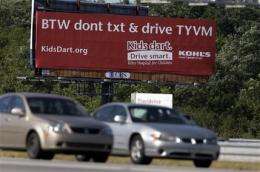States send mixed message on texting and driving

(AP) -- Fiddling with your iPhone behind the wheel can get you fined across much of the nation. But many states are more than happy to tweet you with up-to-the-minute directions on how to steer clear of a traffic jam.
It is a mixed signal that some safety experts and politicians say could be dangerous.
At least 22 states that ban texting while driving offer some type of service that allows motorists to get information about traffic tie-ups, road conditions or emergencies via Twitter.
"You shouldn't be fiddling around with any kind electronic gadget in your car while driving," said Minnesota state Rep. Frank Hornstein, who helped write his state's no-texting-while-driving law.
Nineteen states and the District of Columbia have banned all texting while driving, and eight others prohibit texting by younger drivers only, according to the Governors Highway Safety Association.
Many of these laws essentially bar people from fooling with their smart phones in any way behind the wheel; in some cases, just reading from a mobile device is against the law.
Some supporters of text-messaging bans say that states that provide traffic information via Twitter are undermining these laws.
"I would guess that the states wouldn't intend to be sending a mixed message, but it sounds like it could be a mixed message," said Judie Stone, president of the Washington-based Advocates for Highway and Auto Safety.
State transportation officials say they are not encouraging people to get online behind the wheel. They say drivers should read their tweets before hitting the road.
In Washington state, for example, where citizens and transportation officials can exchange messages about the latest traffic, the feed includes regular reminders not to use the service while driving. "Know before you go," said one feed this week.
Drivers should "check our Web site before leaving. If you're at your office, before you leave and there's an issue on the roadway, it might alter your travel plans home," said Randy Ort, spokesman for the Arkansas Highway and Transportation Department.
The Arkansas ban on texting while driving goes into effect Oct. 1; this week, the state became the latest to provide road conditions via Twitter, the microblogging service that lets people read and send messages of 140 characters or fewer.
Other places offering traffic information via Twitter include: California, Colorado, Delaware, the District of Columbia, Illinois, Indiana, Kansas, Louisiana, Maine, Maryland, Minnesota, Mississippi, Missouri, Nebraska, New York, North Carolina, Oregon, Tennessee, Texas, Utah and Virginia.
The apparent conflict results from two arms of government with seemingly good intentions: transportation departments that want to help motorists cope with traffic, and legislatures that are worried about the deadly consequences of distracted driving.
While Washington state lets motorists tweet about traffic conditions, in most states the flow of information is one-way - from state officials to drivers. Some states, such as New York and Indiana, send lots of up-to-the-minute information. Others just tweet intermittently, or reserve Twitter for emergencies. Mississippi, for example, intends to use its service during hurricane evacuations.
Maine has employed Twitter only to update drivers on an interstate highway project in the Portland area. Nebraska plans to use Twitter during winter weather emergencies. Oregon officials notify drivers about emergency road closings only.
"We don't want people reading their tweets while they're driving," said Sally Ridenour, spokeswoman for the Oregon Department of Transportation.
In Washington state, the 6,200 users can also request estimated travel times, mountain pass reports and waiting times at the Canadian border. Some users apparently just want to chat.
"Got home, got changed, now heading back to seattle for the Mariners game. Keep the roads clear for me on I90 (at)WSDOT :-)," one user posted in late August. The reply from transit officials? "No promises, but we will do our best :) Enjoy the game!"
Others want to know why traffic isn't moving. "wsdot any idea what's going on westbound on 520? it's worse than rush hour..," a user posted. Within a few minutes, officials responded: "Yes! There is a disabled vehicle just east of Lk Wash Blvd blocking right lane."
That kind of exchange, if conducted by drivers behind the wheel, troubles some safety experts.
"If you're sitting there and trying to update the world on the congestion you're in, you could be part of a collision," said Fairley Mahlum, spokeswoman for the AAA Foundation for Traffic Safety. "Did it really matter that you needed to tell everyone and their brother what the situation is? It's just not really not worth it."
The dangers of texting and driving are well documented. The Virginia Tech Transportation Institute found in July that when truck drivers texted, their risk of a collision was 23 times greater. Dialing a cell phone and using or reaching for an electronic device raised the risk of collision about six times in cars and trucks.
A 17-year-old Eureka, Ill., high school student was killed in June when she drove off the road while sending a message to friends. A train wreck in California last year left 25 people dead, including the train operator, who was texting at the time.
Missouri state Sen. Ryan McKenna, who sponsored the law in that state banning texting by drivers 21 and under, said he supports Missouri's Twitter page and doubts police will bust young drivers just for reading tweets. McKenna said his chief concern is drivers typing messages, not those glancing briefly at an incoming tweet.
"You've got to have a little leeway with every law," McKenna said. "I've driven 72 mph in a 70 mph speed limit. People are going to look down real quick" at their phones.
©2009 The Associated Press. All rights reserved. This material may not be published, broadcast, rewritten or redistributed.

















